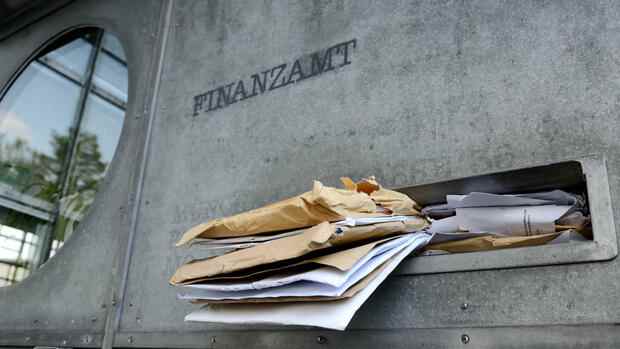The tax offices lack the capacity to carry out the numerous business premises audits for trade tax. That should change in the coming years.
(Photo: PantherMedia/Manuel Findeis)
Zossen The pressure on Germany’s trade tax havens is increasing. Tax authorities want to step up action against companies that only pretend to relocate their headquarters. Politicians put the issue on the agenda.
Trade tax is the most important source of income for municipalities. In times of financial hardship, many cities and municipalities are particularly annoyed by the competition from tax dumping.
In North Rhine-Westphalia, the new black-green state government wants to “oppose” trade tax havens during this legislative period, according to the coalition agreement. Now even individual public prosecutors are conducting proceedings on suspicion of tax evasion.
Business tax: Some municipalities try to undercut their neighbors
The reason? Trade tax havens such as Monheim, Zossen, Grünwald, Lützen and Walldorf charge significantly lower trade tax rates than the national average. The trade tax rate regulates the amount of tax that companies pay on their profits. The German average rate is 435 percent. The so-called trade tax havens estimate well under 300 percent. This caused criticism from neighboring municipalities and state governments.
Top jobs of the day
Find the best jobs now and
be notified by email.
>> Read here: These are Germany’s trade tax havens – a ranking
They accuse the communities with low trade taxes of dumping trade taxes, breeding shell companies, being a breeding ground for tax evasion and acting in a lack of solidarity. Because companies are migrating from the neighboring municipalities to the oases. The Berlin Senator for Finance Daniel Wesener (Greens) says: “We find that the shifting of profits to trade tax havens has become a popular means of tax optimization.”
The federal states are declaring war on the trade tax havens
As a result, the public sector is missing out on trade tax revenue of one billion euros per year throughout Germany. This is the result of calculations by the Tax Justice Network. In addition to Monheim, Zossen and Co., there are 85 other so-called trade tax havens in Germany. They are mainly in Bavaria, but also in Brandenburg, Baden-Württemberg, Saxony-Anhalt, Mecklenburg-Western Pomerania and North Rhine-Westphalia (NRW).
In North Rhine-Westphalia, however, there should soon be an end to trade tax dumping and letterbox companies. The new black-green state government announced in its coalition agreement that it “wants to oppose” trade tax havens. She plans to support the tax authorities with tax audits and to compensate for negative key assignments.
tax dumping
85
business tax havens
are in the federal territory.
NRW is not the first federal state to take action against local authorities with low trade taxes. Measures were also taken in Brandenburg, Hesse and Bavaria.
Stronger cooperation with the tax office
In Brandenburg, the Ministry of Finance announced as early as 2021 that it wanted to intensify cooperation with the responsible tax office for Zossen in order to examine the information provided by the companies more closely. However, not much has changed in Zossen since then.
In the historic heart of the small Brandenburg town, long lists of names still hang on the mailboxes of the old colorful houses. Almost 175 companies are said to have their headquarters in four buildings on Baruther Strasse alone. As many as 203 companies are listed on the doorbell of the office community address at Hauptstraße 28 in Zossen.
A spokesman for the Zossen tax office said: “The measures have not yet been completed.” The aim is to check the information provided by the company on the management establishment, to determine the actual location of the management and to find out which local tax office is responsible for determining the to answer the business tax amount.
>> Read here: Tax havens like Monheim are coming under pressure
According to information from the “Süddeutsche Zeitung”, e-mails with the subject “Commercial tax havens – letterbox companies” were sent to the tax offices in Munich and Hesse at the beginning of the year. In these, the tax offices in Bavaria were asked to report cases. Similar queries were also run in the Hessian tax offices in the autumn.
Public prosecutors are investigating shell companies
The air is getting even thinner for mailbox companies in Munich and Berlin. Public prosecutors are now even investigating some entrepreneurs there for business tax evasion. This was confirmed to the Handelsblatt by persons entrusted with the matter. The investigations came partly in the course of the mask scandal last year. The investigating authorities noticed that the companies had possibly wrongly registered in a tax haven.
The tax offices are trying to take action against letterbox companies.
(Photo: dpa)
Associations and tax law experts have been calling for a reform of trade tax for years in order to prevent inequalities caused by tax competition. As early as 2019, Johanna Hey, head of the Institute for Tax Law at the University of Cologne, criticized the German go-it-yourself approach to corporate tax. Hey calls for the trade tax to be restructured “for example into a municipal surcharge on income and corporation tax”.
>> Read here: Municipalities book 35 percent more from business taxes than in 2020
The Federation of German Industries (BDI) supports the reform proposals. Instead of the current model, the tax should be integrated into other income taxes. According to the association’s position paper, this is the only way to achieve uniform assessment bases for corporate taxes at EU level.
In September, the German Association of Cities again expressed criticism of the inner-German tax havens. Chief Executive Helmut Dedy (SPD) calls on the federal government to “resolutely combat the unfair tax practices of trade tax havens”. The Association of Cities submitted proposals to the Federal Ministry of Finance. However, there are no concrete plans from the federal government.
